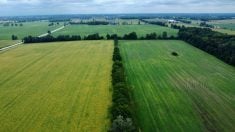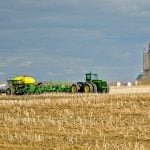Food security, labour and food-informed policymaking are among the top concerns for Canadian fruit and vegetable growers ahead of the 2025 federal election.
A recently released election priority statement from the Fruit and Vegetable Growers of Canada (FVGC) titled “Election 2025: Cultivating Resiliency” lays out what matters to Canadian fruit and vegetable farmers amidst the looming threat of U.S. tariffs.
“With 47.5 per cent of Canada’s fruit and vegetable production and 91.5 per cent of total exports destined for the United States, our sector is vulnerable to cross-border trade disruptions and irritants,” the statement said.
Read Also

New Iridium technology helps block GPS spoofing
A tiny new chip will allow Iridium’s Positioning, Navigation and Timing (PNT) signals to be received much smaller devices, create a backstop against Global Positioning Systems (GPS) spoofing.
The top listed priority is “applying a food lens to policymaking,” which suggests the government employ a food-informed approach to policy the same way it does with gender equity or climate change.
“Without a food lens, well-intended policies can exacerbate food insecurity, limit farm profitability, or hinder innovation,” the statement read. “By integrating food security into decision-making, Canada can better balance environmental goals, economic growth and food system resilience.”
FVGC also highlighted the need for overhauled business risk management (BRM) in Canada, stating Canada’s five existing programs “have proven inadequate for the unique needs and challenges of the fruit and vegetable sector,” particularly as sudden tariffs change the tone of trade discussions.
Competitiveness for the sector is another key concern deeply impacted by tariffs.
“The recent resurgence of U.S. tariff threats has underscored how exposed the sector is to geo-political and economic shocks beyond its control,” the statement read. “Eliminating the threat of tariffs and establishing clear, sector-specific support in the event of future trade actions must be top priorities.”
FVGC pointed to the fruit and vegetable sector’s reliance on the U.S. for 97 per cent of its exports as well as the lack of trade safeguards, and recommends reflecting Canadian horticulture’s specific needs in trade policy, including perishability and seasonality.
Ontario represents one of the largest shares of the fruit and vegetable sector in Canada: According to statistics Canada, the province represented 13.7 per cent of national fruit production and 49.2 per cent of national vegetable production in 2024.
The Ontario Fruit and Vegetable Growers’ Association (OFVGA) released a federal policy priority list of their own March 27, which shared several concerns with the FVGC, including labour sustainability and access to crop protection tools.
A representative from OFVGA told Farmtario in an email it “supports FVGC’s policy priorities, which address the needs of growers across Ontario” and OFVGA’s own statement “puts an Ontario lens on what the sector needs to succeed in these challenging times.”














